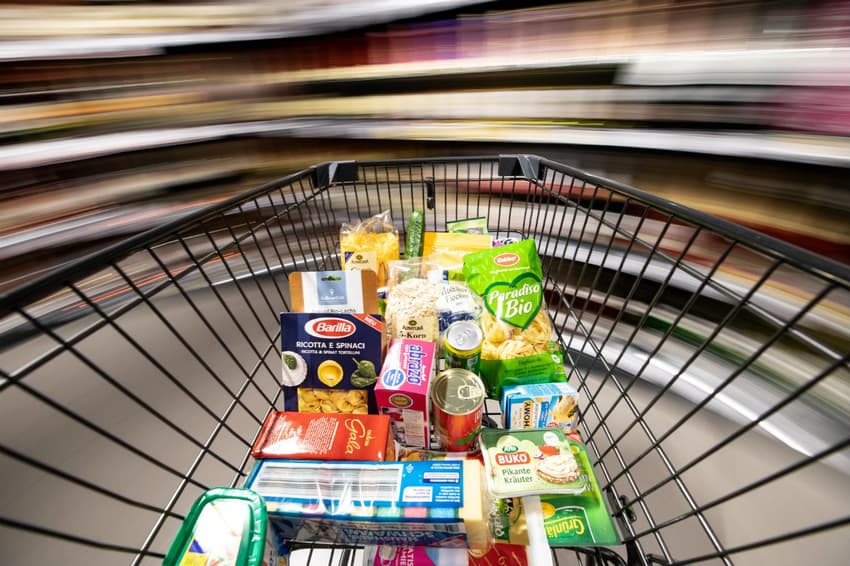German word of the day: Der Hamsterkauf

This word has been showing up in many coronavirus headlines in the last few days.
What does it mean?
Der Hamsterkauf is a German word used to describe the panic buying or hoarding that occurs during times of widespread fear or concern.
It comes from the verb hamstern, which means “to hoard or panic buy” since hamsters are known for filling their cheeks with food.
How is it used?
In Germany, this word has also been used to describe the rush on supermarkets that occurs before long holiday weekends when supermarkets will be closed and, as many of us living in Germany know, every Saturday night before supermarkets shut their doors on Sunday.
READ ALSO: Aldi makes Hamsterkauf joke
This word is most commonly used with the verb “machen,” as in the phrase Hamsterkäufe machen bei Knappheit, “to panic buy.”
#Hamsterkauf heute Morgen gab es nicht nur leere Regale bei #metro, sonder um 10:45 auch diese hier bei #Aldi Friedrichshain. Basmatireis ist schwer zu bekommen.. pic.twitter.com/Csh4oBdJF1
— Berlin Polar (@BerlinPolar) February 28, 2020
"Basmati rice is hard to find." Pictures of empty shelves in parts of Berlin.
Coronavirus leads to Hamsterkäufe in Germany
With coronavirus cases on the rise in Germany, several supermarket chains have reported cases of Hamsterkauf in their stores.
After the first coronavirus patient was confirmed in North Rhine-Westphalia on Tuesday evening, photos of empty supermarket shelves in the Heinsberg district where he lives were already popping up on Twitter Wednesday.
So sieht es gerade in einem von drei Aldis in unserem 45.000-Einwohner-Städtchen aus: Konserven und Eingemachtes Mangelware, kaum noch Ravioli, einzelne Brotsorten sind ausverkauft, keine Spaghettis mehr. Die Panik ist längst da.#aldi #coronavirus #erkrath #hamsterkauf pic.twitter.com/Q94S4bUT6f
— chriszim (@chriszim) February 27, 2020
One Aldi in Erkrath, a town of 45,000 inhabitants in NRW, ran out of lots of canned goods, pastas, and breads early on. This user later tweeted that many of the products have since been restocked.
Aldi and Lidl reported an increased demand for dried food, as well as flour, baking mix, sugar, and hygiene products. In addition, stores across the country have reported selling out of hand sanitizer and face masks in the wake of the virus.
#Hamsterkauf In Hilden sieht es auch schon übel aus #COVIDー19 #Coronavius pic.twitter.com/vQnhOvCmAW
— Lisa Didschuneit (@Kopferbrechen) February 27, 2020
This user tweeted about how bad the Hamsterkauf looked in Hilden.
Example Sentences:
Meine Mama macht immer Hamsterkäufe vor den Ferien.
My mom always panic buys before the holidays.
Normalerweise kaufen Menschen beim Hamsterkauf getrocknete Lebensmittel und Hygieneprodukte.
Normally people purchase dried groceries and hygiene products when they panic buy.
Comments
See Also
What does it mean?
Der Hamsterkauf is a German word used to describe the panic buying or hoarding that occurs during times of widespread fear or concern.
It comes from the verb hamstern, which means “to hoard or panic buy” since hamsters are known for filling their cheeks with food.
How is it used?
In Germany, this word has also been used to describe the rush on supermarkets that occurs before long holiday weekends when supermarkets will be closed and, as many of us living in Germany know, every Saturday night before supermarkets shut their doors on Sunday.
READ ALSO: Aldi makes Hamsterkauf joke
This word is most commonly used with the verb “machen,” as in the phrase Hamsterkäufe machen bei Knappheit, “to panic buy.”
#Hamsterkauf heute Morgen gab es nicht nur leere Regale bei #metro, sonder um 10:45 auch diese hier bei #Aldi Friedrichshain. Basmatireis ist schwer zu bekommen.. pic.twitter.com/Csh4oBdJF1
— Berlin Polar (@BerlinPolar) February 28, 2020
"Basmati rice is hard to find." Pictures of empty shelves in parts of Berlin.
Coronavirus leads to Hamsterkäufe in Germany
With coronavirus cases on the rise in Germany, several supermarket chains have reported cases of Hamsterkauf in their stores.
After the first coronavirus patient was confirmed in North Rhine-Westphalia on Tuesday evening, photos of empty supermarket shelves in the Heinsberg district where he lives were already popping up on Twitter Wednesday.
So sieht es gerade in einem von drei Aldis in unserem 45.000-Einwohner-Städtchen aus: Konserven und Eingemachtes Mangelware, kaum noch Ravioli, einzelne Brotsorten sind ausverkauft, keine Spaghettis mehr. Die Panik ist längst da.#aldi #coronavirus #erkrath #hamsterkauf pic.twitter.com/Q94S4bUT6f
— chriszim (@chriszim) February 27, 2020
One Aldi in Erkrath, a town of 45,000 inhabitants in NRW, ran out of lots of canned goods, pastas, and breads early on. This user later tweeted that many of the products have since been restocked.
Aldi and Lidl reported an increased demand for dried food, as well as flour, baking mix, sugar, and hygiene products. In addition, stores across the country have reported selling out of hand sanitizer and face masks in the wake of the virus.
#Hamsterkauf In Hilden sieht es auch schon übel aus #COVIDー19 #Coronavius pic.twitter.com/vQnhOvCmAW
— Lisa Didschuneit (@Kopferbrechen) February 27, 2020
This user tweeted about how bad the Hamsterkauf looked in Hilden.
Example Sentences:
Meine Mama macht immer Hamsterkäufe vor den Ferien.
My mom always panic buys before the holidays.
Normalerweise kaufen Menschen beim Hamsterkauf getrocknete Lebensmittel und Hygieneprodukte.
Normally people purchase dried groceries and hygiene products when they panic buy.
Join the conversation in our comments section below. Share your own views and experience and if you have a question or suggestion for our journalists then email us at [email protected].
Please keep comments civil, constructive and on topic – and make sure to read our terms of use before getting involved.
Please log in here to leave a comment.